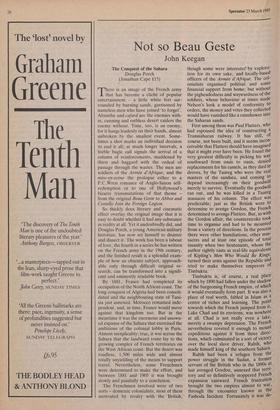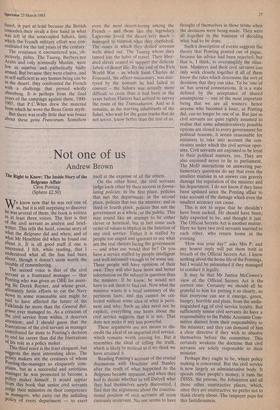Not so Beau Geste
John Keegan
The Conquest of the Sahara Douglas Porch (Jonathan Cape £15) There is an image of the French army that has become a cliché of popular entertainment — a little white fort sur- rounded by burning sands, garrisoned by nameless men who have joined `to forget'. Absinthe and cafard are the enemies with- in, cunning and ruthless desert raiders the enemy without. Time, too, is an enemy, for it hangs leadenly on their hands, almost unbroken by the smallest event. Some- times a shot marks an individual decision to end it all; at much longer intervals, a feeble bugle call signals the arrival of a column of reinforcements, maddened by thirst and haggard with the ordeal of passage through the wastes. The men are soldiers of the Armee d'Afrique, and the mise-en-scene the prologue either to a P.C.Wren romance of Anglo-Saxon self- redemption or to one of Hollywood's bizarre transmutations of that theme from the original Beau Geste to Abbot and Costello Join the Foreign Legion.
So thickly does literary and cinematic effect overlay the original image that it is easy to doubt whether it had any substance in reality at all. Yet it undoubtedly did, and Douglas Porch, a young American military historian, has now set himself to disinter and dissect it. The work has been a labour of love, the fourth in a series he has written on the French army in the 19th century, and the finished result is a splendid exam- ple of how an obscure subject, approach- able only through difficult original re- search, can be transformed into a signifi- cant and eminently readable book.
By 1881, France had completed its occupation of the North African coast. The long conquest of Algeria had been consoli- dated and the neighbouring state of Tuni- sia just annexed. Morocco remained inde- pendent, and, in time, France would move against that kingdom too. But in the meantime it was the enormous and unown- ed expanse of the Sahara that exercised the ambitions of the colonial lobby in Paris. Almost inexplicably; true, it was across the Sahara that the landward route lay to the growing complex of French territories on the West African coast. But the desert was roadless, 1,500 miles wide and almost totally unyielding of the means to support travel. Nevertheless, some Frenchmen were determined to make the effort, and between 1881 and 1905 it was brought slowly and painfully to a conclusion.
The Frenchmen involved were of two sorts — domestic colonialists, most of them motivated by rivalry with the British, though some were interested by explora- tion for its own sake, and locally-based officers of the Armee d'Afrique. The col- onialists organised political and some financial support from home; but without the pigheadedness and waywardness of the soldiers, whose behaviour at times made Nelson's look a model of conformity to orders, the money and votes they collected would have vanished like a rainshower into the Saharan sands.
First among them was Paul Flatters, who had espoused the idea of constructing a Transsaharan railway. It has still, of course, not been built, and it seems incon- ceivable that Flatters should have imagined that it might ever have been. He found the very greatest difficulty in picking his way southward from oasis to oasis, denied replacements for his camels, as they died in droves, by the Tuareg who were the real masters of the sandsea, and coming to depend increasingly on their goodwill merely to survive. Eventually the goodwill ran out, and he was killed in a Tuareg massacre of his column. The effect was predictable; just as the British were to determine to avenge Gordon, the French determined to avenge.Flatters. But, as with the Gordon affair, the counterstroke took time to organise and had to be mounted from a variety of directions. In the process there were other humiliations, other mas- sacres and at least one episode of total insanity when two lieutenants, whom the author rightly casts as real-life equivalents of Kipling's Men Who Would Be Kings, turned their arms against the Republic and tried to make themselves emperors of Timbuktu.
Timbuktu is, of course, a real place which by 1890 had fallen under the shadow of the burgeoning French empire, of which it would eventually form part. It was also a place of real worth, fabled in Islam as a centre of riches and learning. The point towards which the French jumped from it, Lake Chad and its environs, was nowhere at all. Chad is not really even a lake, merely a swampy depression. The French nevertheless coveted it enough to mount expeditions against it from three direc- tions, which culminated in a sort of victory over the local slave driver, Rabih, who made himself king of the southern Sahara. Rabih had been a refugee from the power struggle in the Sudan, a former servant of the British who in the 1890s at last avenged Gordon, annexed that terri- tory and so definitively stoppered French expansion eastward. French frustration brought the two empires almost to war, through the encounter known as the Fashoda Incident. Fortunately it was de- fused, in part at least because. the British conceded their rivals a free hand in what was left of the unoccupied Sahara, into which the French military effort was con- centrated for the last years of the century. The resistance it encountered was, ob- jectively, paltry. The Tuareg, Berbers not Arabs and only nominally Muslim, were few in number and pathetically badly armed. But because they were elusive, and as self-sufficient as any human being can be in the desert, they confronted the French With a challenge that proved wholly absorbing. It is perhaps from the final Years of the campaign against them, 1900- 1905, that P.C.Wren drew the material from which he wove the Beau Geste myth. But there was really little that was beaux about these gesta Francorum. Somehow even the most desert-loving among the French – and those like the legendary Laperrine loved the desert very much managed to blemish what they cherished. The oases at which they drilled artesian wells dried out. The Tuareg whom they tamed lost the habit of travel. Their liber- ated slaves ceased to support the delicate fabric of desert life. By the end of the First World War – in which Saint Charles de Foucauld, the officer-missionary, was mar- tyred by the nomads he had failed to convert – the Sahara was actually more difficult to cross than it had been in the years before Flatters had arrived to survey the route of the Transsaharien. And so it remains, as the starving inhabitants of the Sahel, who wait for the grain trucks that do not arrive, know better than the rest of us.















































 Previous page
Previous page